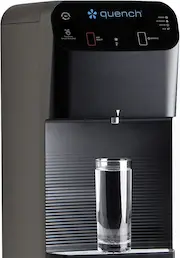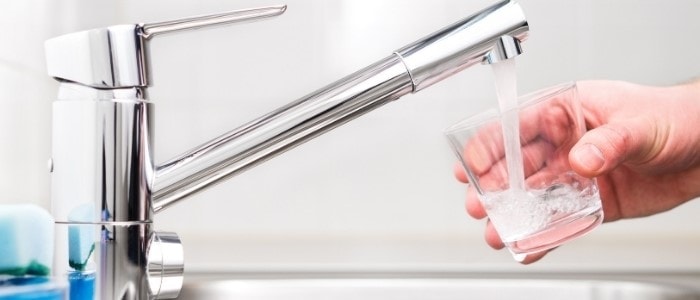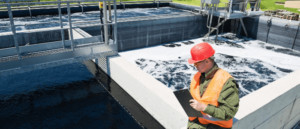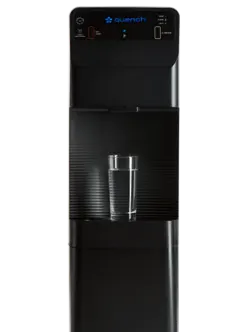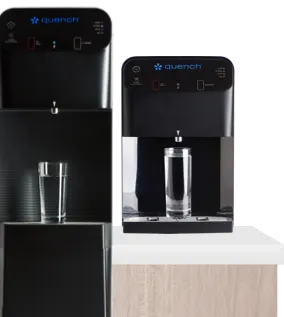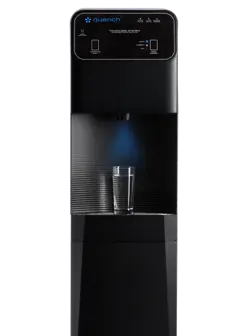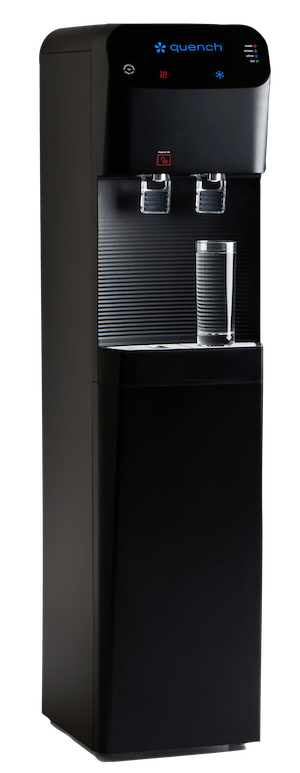This article was updated on 7/7/2022
Tap water may seem simple on the surface but zoom down to a microscopic level and you’ll find a lot more than hydrogen and oxygen. Water treated at local water facilities often contains a series of naturally occurring harmless chemicals, minerals, and sediments. Unfortunately, tap water may also have some level of potentially harmful substance contamination, including heavy metals — namely, lead. With increased public awareness about the dangers of aging infrastructure and news headlines of compromised municipal water sources, concerns about lead in drinking water are commonly raised in our local water experts’ consultations.
As concerns over safe water sources grow, we’re taking a deeper look into the essential nature of lead filters for workplace drinking water and why your organization might consider an advanced water filtration system moving forward.
Lead and Your Workplace Drinking Water
Providing your valuable employees, guests, and customers with clean water that tastes great is a key factor in driving hydration throughout the workplace. This has been an increasingly important area of focus for organizations considering an estimated 75% of Americans suffer from chronic dehydration, per a report from Forbes. Unfortunately, not all water is created equal. To achieve the highest drinking water quality at work, it’s up to organizations to monitor their local water supply and introduce solutions — such as top-tier water filters — that mitigate the risk of contaminants.
One of the key substances that a water filter is typically working to reduce is lead. But, you might be wondering what exactly that means. To answer this, we’re covering everything you need to know about lead and workplace drinking water — so organizations can better understand the importance of implementing strategies for lead reduction, as well as how to find the best water filter for your business.
The relationship between lead and drinking water
Lead is a naturally occurring heavy metal that, if ingested, can negatively affect nearly every organ in the body and the nervous system as well. It’s been used for thousands of years in a myriad of forms — some safer than others — due to its malleability and easy extraction. As far back as the Roman Empire, where the metal was used to make water pipes, lead has found its way into drinking water.
Where does lead in water come from?
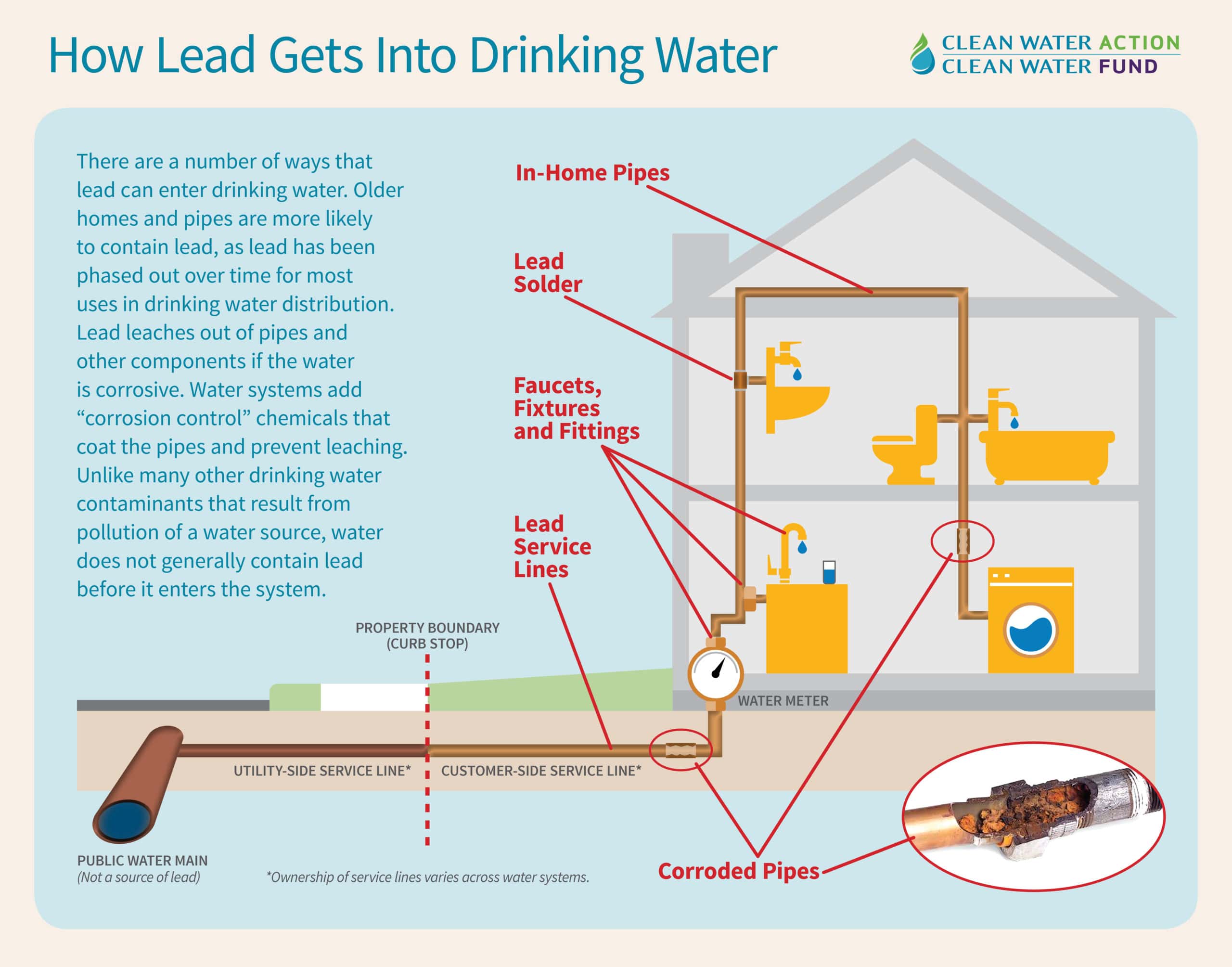
Image Courtesy of cleanwateraction.org
Lead in water most often comes from pipes, faucets, plumbing solder, fixtures, and fittings, especially those made before 1986. While lead water pipes have long been phased out, smaller lines that bring water into your home or office can be made of lead. Buildings without a lead service line can still face water contamination through brass or chrome-plated brass faucets and other fixtures that have been soldered with lead — as well as lead-lined tanks in water fountains. Lead pipes are more likely to be found in older cities and buildings constructed before, you guessed it, 1986.
Lead enters drinking water through a chemical reaction in lead-containing plumbing materials — corrosion — which wears away at the pipes or fixtures. This reaction becomes more severe in water that’s more acidic and has lower mineral concentration. Treatments to increase the pH of water, reduce its acidity, and make water less corrosive on its way through your faucet are just one of many steps taken to ensure a healthy, tasty water supply. The Safe Drinking Water Act, the US federal law protecting drinking water, and the Environmental Protection Agency (EPA)’s Lead and Copper Rule have set the standard for the maximum allowable lead content in an area’s water supply. Those standards and regulations are meant to ensure your local water supply maintains a safe level of lead in water ppm (parts per million).
How can you check for lead in your drinking water?
Ideally, your drinking water will be free of lead — unfortunately, it’s safe to say organizations shouldn’t assume this is the case. The best way to guarantee your workplace water is safe to drink is to get it checked out by a professional. This contaminant is a silent threat that can easily go undetected since you can’t see, smell, or taste dissolved lead in water. Get in touch with Quench’s local water experts to confirm exactly what kind of local water you’re dealing with and how much lead is safe for your situation.
You can also check the list of certified laboratories available from your state or local drinking water authority. Those experts will be able to provide you with useful information, including whether the service connector used in your office building is made of lead.
How Lead in Your Organization’s Drinking Water Impacts Your Workforce
How much lead is safe to consume?
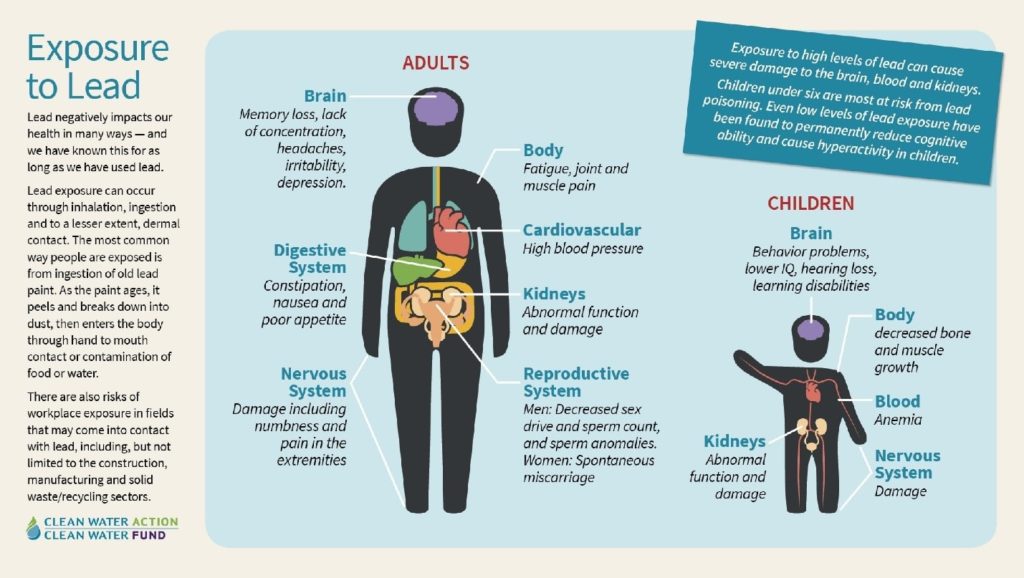
Image Courtesy of cleanwateraction.org
Humans can become exposed to lead through inhalation, ingestion, and skin contact. There is value in understanding how much lead is safe from a health standpoint. Lead exposure can be dangerous even at low levels, especially among children, babies, fetuses, and pregnant people. Those at the highest risk, and the negative consequences they can experience, include:
- Young children: A small dose of lead that would be harmless to an adult can significantly harm young children, including damage to the central and peripheral nervous systems, behavioral and learning disabilities, lower IQ, hyperactivity, anemia, and hearing impairment.
- Pregnant women: Individuals who are pregnant run the risk of negatively impacting their child when exposed to lead in water. Possible consequences to pregnant individuals and their unborn babies include reduced fetus growth and risk of premature birth.
- Adults: Adults who suffer significant lead exposure can experience a wide array of concerning health problems. A few of these health issues include cardiovascular problems, decreased kidney function, and reproductive problems — among other symptoms.
Even the lowest levels of lead in drinking water can cause adverse health effects. Any amount less than .001 ppm is considered a safe level of lead in water ppm. If your water exceeds those limits, you’ll need to take action to ensure the safety of your employees that work in your building. The steps you’ll take to reduce the chances of ingesting lead will vary depending on the amount of lead detected in your water.
Steps to reduce lead levels in your workplace water
For organizations proactively working towards lead removal, there are a few steps you can take to reduce the risk of lead exposure at work. These best practices include:
- Speaking to a professional: If you’re not sure where to start, you can’t go wrong working with water experts and industry professionals. These individuals are a valuable resource to help your business understand your workplace drinking water and the specific next steps needed to elevate your unique water supply.
- Having your water tested: Considering that lead levels in water can vary significantly across the country, it can be beneficial to contact your water utility and have your water tested. In turn, these professionals can offer vital insights into your local water quality and the lead levels your workplace might be exposed to.
- Using cold water: While there are ways to reduce lead in both cold water and hot water, it’s essential to note that boiling water does not remove lead or lower the contaminant’s levels, according to a report from the New Mexico Department of Health. The Minnesota Department of Health also found that hot water releases more lead from pipes as well — so without a proper water filtration system in place, it’s safer to choose cold drinking water at work.
- Learning if you have a lead service line: If you plan to contact your water utility regarding water quality, it’s also advantageous to see if the pipe that connects to your water line is made from lead. This information can give your business a better idea of what you’re up against when it comes to reducing lead in your workplace drinking water.
- Using your filter properly: Water filters are a useful line of defense against lead exposure at work. However, it’s integral to use your filter properly for the best results. This includes ensuring it’s the right solution for your area’s water, making sure it’s properly installed and taken care of, and replacing your cartridge — if applicable — when necessary.
- Considering a more advanced filter: If your organization utilizes a water filter and wants to reduce lead in your supply, it might be time for an upgrade. Modern water filtration systems can transform workplace drinking water into a supply that’s cleaner, healthier, and more appealing. Moreover, working with dependable vendors like Quench not only helps your organization guarantee you’re using the filter that’s effective and well-suited but also ensures qualified technicians and water experts are at your disposal when needed.
The Benefits of Providing Clean Drinking Water to Your Employees
Organizations are always intent on seeing employees succeed, and giving them access to clean water at work may be a more important element of organizational success than meets the eye. Whether employers are aware of this or not, proper hydration has far-reaching benefits for individuals — which is ultimately a boon to your organization
Implementing strategies to reduce lead in your workplace drinking water can lead to a number of workplace advantages including, but not limited to:
- Boosted hydration throughout the office: While this benefit may seem obvious, the impact of a well-hydrated workforce can’t be understated. Improving water intake at work can help employees avoid the negative consequences of dehydration while enjoying the benefits that sufficient hydration can offer — from engagement to wellness and everything in between.
- Reduced fatigue in employees: Individuals feel significantly less tired when they’re properly hydrated. Without fatigue holding them back, employees are able to pay more attention to their work and produce higher-quality work as a result.
- Prevented water-borne illness: According to The World Counts, 3.575 million people die each year as a direct result of water-borne illness. Monitoring your water supply — and introducing strategies and solutions to reduce any contaminants that might be present — can go a long way toward mitigating the possibility of water-borne illness in your team members.
- Improved workplace sanitation standards: Still reeling from the aftermath of the pandemic, workers are increasingly in search of clean workplaces that make them feel comfortable and safe. Actively working to elevate your water supply not only supports high sanitation standards but also expresses to employees that you prioritize their health, happiness, and well-being.
- Greater levels of energy, focus, and productivity: The impacts of sufficient hydration are plentiful — among the top advantages are bringing energy, focus, and productivity to the next level throughout your workforce. Driving hydration will be an effective strategy for organizations to help employees reach their maximum potential at work.
The Right Filtered Water Dispenser Can Reduce Lead in Your Drinking Water
Quench Water Experts recommend filtered water dispensers with advanced carbon or reverse osmosis filtration for businesses worried about lead in their water. If your organization has been in search of the right dispenser and filtration system to reduce lead levels in your water supply — Quench can help. Our specific filtration methods are certified to reduce lead in drinking water.
Our filtered water dispensers are equipped with advanced carbon filtration and reverse osmosis (RO) filtration systems. If lead is your main concern, the Quench Water Experts recommend a carbon filter (like the P02800) that is certified by a 3rd party laboratory to reduce up to 99% of lead in your workplace drinking water . These carbon filters that make the dissolved lead adsorb on the carbon. Carbon filters can also remove microscopic impurities, and eliminate off-tastes and odors caused by chlorine, sulfides, and other chemicals as well. If lead is only part of the problem, we recommend a filtered water dispenser with built-in reverse osmosis (RO) filtration system. RO systems may reduce not just lead, but asbestos, copper, chromium, radium, pharmaceuticals, and more. With a carbon and reverse osmosis filtration system in place, your business can rest assured that your employees, guests, and customers have access to clean water year-round.
Did you know Quench has our very own branded RO water that is not only clean but delicious as well? It’s called quenchWATER+ and it’s offered with our Quench Q-Series filtered water dispensers, including the touchless Quench Q12. quenchWATER+ goes through 5 stages of filtration to safeguard your employees against contaminants and impurities. Even better, the RO water passes over compressed minerals in our Mineral+ filter to add back a blend of calcium, magnesium, sodium, potassium, and other healthy minerals to create electrolyte-enhanced alkaline water.
Quench Water Experts are here to make sure you’re choosing the safest and best-tasting water for your business. If you have lead concerns, we want to hear about them. Schedule an appointment with your local water expert today.
Quench Model P02800 1 Micron Lead Reduction Block is certified by IAPMO R&T, according to NSF/ANSI 42, 53, 372 and CSA B483.1, for reduction of lead, chlorine, taste, & odor, and lead free requirements. Quench machines are also certified by IAMPO R&T against NSF/ANSI 58, 372, and CSA B483.1 for material safety, structural integrity and lead free requirement. Assumes normal usage, regular preventive maintenance, and filter changes.
